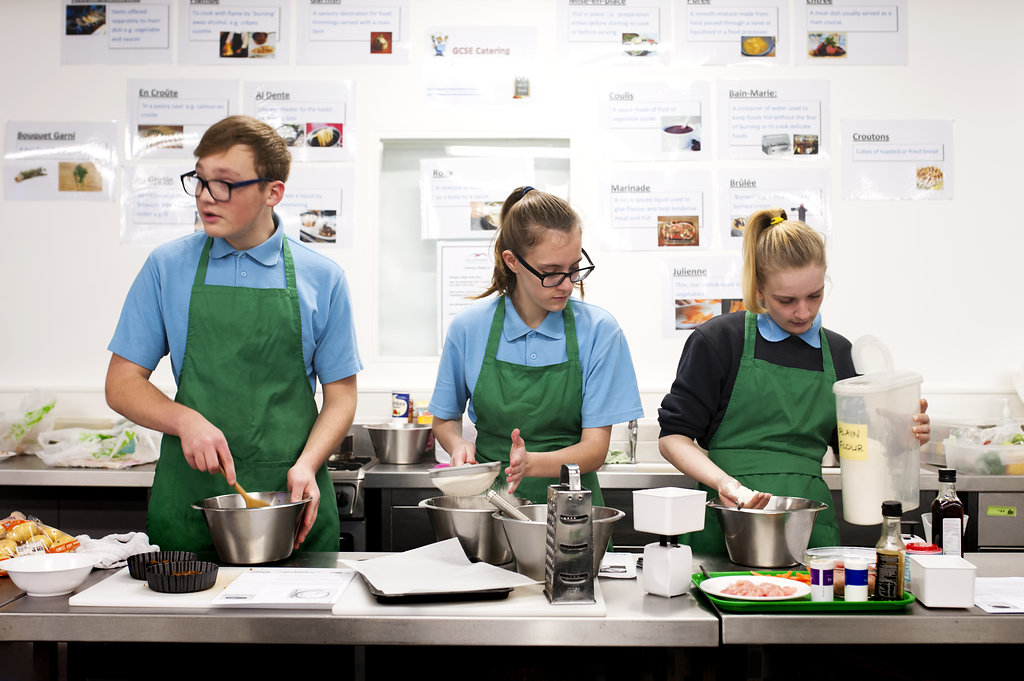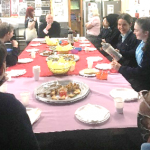New GCSE from 2016: GCSE Food Preparation and Nutrition
Students who started at Jo Richardson in 2013 or after will have the opportunity to study a brand new GCSE called Food Preparation and Nutrition. For further details on the course content, click here.
Exam Board: AQA (subject to accreditation by OFQUAL)
This GCSE will equip students with the knowledge, understanding, skills and encouragement they need to cook. At the heart of the qualification it focuses on practical cooking skills as well as giving students a strong understanding of nutrition as well as an understanding of the characteristics of food. The units studied throughout Year 10 and 11 will be:
- Food, nutrition and health
- Food science
- Food safety
- Food choice
- Food provenance
Assessment:
GCSE food preparation and nutrition will be assessed as follows:
| % of GCSE |
Assessment |
Details |
| 50% |
Examination |
One examination worth 100 marks. Students will have 1 hour and 45 minutes to complete. The exam has two sections;
· Section A – Multiple Choice (20 marks)
· Section B – Longer structured questions (80 marks)
The exam is sat at the end of the course. |
| 15% |
Non Exam Assessment – Task 1 |
Food Investigation – Students will be set a question to investigate the understanding of working characteristics and chemical properties of ingredients. Students will need to complete a 1500 – 2000 word report and submit with photographic evidence of their investigation. Tasks are set by the exam board and released 1st September of examination year. |
| 35% |
Non Exam Assessment – Task 2 |
Food Preparation Assessment – Students will prepare, cook and present a final menu of three dishes within a single period of no more than three hours, planning in advance how this will be achieved. Tasks are set by the exam board and released 1st November of examination year. |
*GCSE Catering – Last Award 2017*
Students who started Jo Richardson in 2012 or before had the option to study GCSE Catering using the WJEC exam board.
“The specification is designed to give candidates an opportunity to extend and apply their skills and knowledge of the catering industry within a variety of contexts. It will concentrate on the main areas of food production and food service as an introduction to the catering industry. The specification provides progression opportunities both directly into employment and to further learning opportunities within employment, or to further study.” (WJEC 2009)
The GCSE Catering Course is assessed as follows:
| % of GCSE |
Assessment |
Details |
| 20% |
Practical Assessment 1 |
Completed at the end of year 10. Task is set by exam board. |
| 40% |
Practical Assessment 2 |
Completed during year 11. Task is set by exam board |
| 40% |
Exam |
Written examination. 75 minutes in duration. One paper from grade A*- G. Completed at the end of year 11. |
In Year 10 students will study:
- The industry – food and drink.
- Health, safety and hygiene.
- Food preparation, cooking and presentation.
- Nutrition
- Costing and portion control.
In Year 11 students will study:
- The industry – food and drink (building on knowledge of year 10)
- Job roles, employment opportunities and relevant training.
- Specialist equipment.
- Communication and record keeping.
- Environmental considerations.
For further details please see the specification from WJEC.
Homework:
A proportion of homework in Key Stage 4 is for students to organise their ingredients and containers for their next practical lesson. Ingredients are recorded in the student’s planners two weeks in advance.
In addition to ingredients preparation, students will be set a mixture of theory based tasks, normally one every two weeks. Homework tasks will be a mixture of research, short question responses and longer response questions. In the build up to assessments, homework tasks, will be used to help students prepare i.e. revision for a test. All homework tasks are available to download from the student shared area. Homework tasks will either be teacher assessed, self-assessed or peer assessed.
Useful Websites:
Students can use the following websites to support them during the course:





